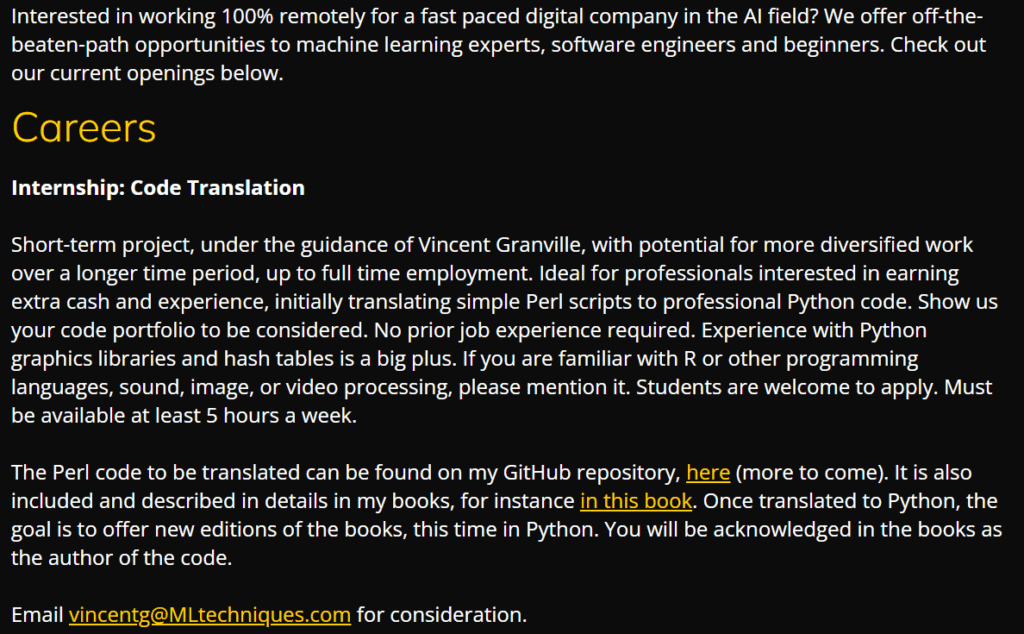
I tested the job market in the last two weeks, both as an applicant, and as a hiring manager. I share my experience here. It is radically different from what you read in the news, or from what most people say. Data scientists and machine learning engineers looking for a new job are out there. Make some little efforts to find them.
Recruiters Miss Many Applicants
It seems as if recruiters are watching the night sky with the naked eye, and conclude that there are only a few dozen stars (the talent) in the universe. Or they are burying their head in the sand, and then claim that they don’t see applicants. It has to do in part with the use of archaic keyword-based tracking systems (an example of AI technology that should be substantially upgraded), and an old-fashioned mentality on how to look at resumes. Most resumes never make it to an actual person reading it.
I decided, after 20 years surviving (very well) without any resume, to create one and submit it to highly targeted job vacancies. I went through the tedious process of filling numerous forms on Apple, Amazon and other company websites. Some had unexpected questions: are you a transgender? what is your race? are you disable? I included all the links that were optional (LinkedIn profile, work sample, GitHub repository and so on). One even asked for vaccination status. I claimed I was fully vaccinated (I gained immunity the natural way). Out of 15 applications, I received three answers “sorry, we moved with a different candidate”, one asking for a zoom interview, and that’s it.
My Test Resume
My resume is non-traditional and reflects my personality. You either love it, or hate it. It has my picture at the top, as it represents my brand – like it or not. After all, I am regularly featured as a top 10 data science influencer (see here). Thus, I expect some managers to recognize me from my picture. It is also designed to filter out the numerous hiring managers adverse to change or creativity, and to attract the opposite.
I was very honest. Nothing is inflated. I did not include skills such as Python. I’d have to seriously learn it to begin with, which should be easy given my long Perl and C++ experience. Part of it is to avoid getting interviews for positions disguised as director of data science, but which are essentially pure coding jobs. I also believe in coding automation. FinaIly, I targeted data science writer, fraud detection senior data scientist (my deepest experience), and related positions. See my resume here.
Insights from my Test Application
Given the abysmal performance, I decided to share my experience on Facebook, on the local Redmond group. Redmond in Washington state is a bit like Menlo Park in California: a town filled with tech people, and also the headquarters of Microsoft. I live 5 miles away from it.
Whatever you may say about my resume, it is clear that qualified applicants are routinely rejected. Many for reasons other than mines. In my case, you could argue that many employers do not want to hire an entrepreneur. But among the numerous comments, there is a recurrent theme: recruiters only have 5 seconds to look at a resume. This is assuming that they actually see your resume. Most of the time they don’t, and they admit it. If you only have 5 seconds, you must face an army of applicants: those few going through the firewall. It means that you get tons of applicants managing to hit your mailbox. Or else, as a recruiter, you are only looking for a paycheck, not bothered to read resumes. Below is the most interesting reply to my post. It is from a principal software engineer (hiring manager) at Microsoft.
Perspective from a Hiring Manager
As a hiring manager, here’s my immediate feedback from a 10 second review (which is really all you get to make a first impression): your resume would probably be thrown out by automated processes.
Almost every company today has at the first stage an automated system screening candidates. That your resume is highly non-traditional and difficult to parse is a strong indication that either that automated process will reject it without ever seeing a human or the first person to see it (almost always an HR representative that has no idea how to judge a candidate) will throw it out immediately. You’re probably never getting your resume into the hands of someone who actually knows if you’re qualified.
Does that process suck? Absolutely. I hate that this is what we’ve become. But when you’re playing the game you have to follow the rules no matter how much you hate them or you’re just going to lose.
Most importantly, don’t confuse a labor shortage for desperation. It is VERY difficult to fire a bad hire, especially in the current market. The company would much rather screen out good candidates than hire someone who is not qualified. The business will lose money because they don’t have enough labor, but not anywhere near as much as they could lose from a bad hire that tanks the business or needs to be managed (which is also usually a demoralizing event for the rest of the team). Note I’m not saying you’re a bad candidate, I’m just saying that the company doesn’t know and when they have someone that doesn’t fit quite right, they’d rather just say no than take a gamble.
That being said, I recommend you introspect on this for a moment. If your default reaction is “there’s nothing wrong with what I did, it must be all of those companies lying” then you show a serious red flag for ability to self reflect and improve, which is a very critical skill in every industry. ESPECIALLY when just about everyone here was able to give you the same immediate feedback about your resume (literally asking anyone to review it would have gotten you this feedback). Please take that as a lesson for self reflection.
My Job Ad as an Hiring Manager
I also did the opposite. Posting a job ad. This was not a test, but a real ad. Emphasis was on 100% telecommute (it’s OK if you are 7,000 miles away), and on what the candidate can gain career-wise through the job. No HR middleman to screen you out. I don’t have an HR person at my company, and I don’t have office space. Thus I can offer a better pay. The successful applicant knows who he would end up working with, and what the projects are (there was a link to my GitHub repository). Rather than a generic “Python needed”, I included something more specific, likely to attract some attention.
[…] initially translating simple Perl scripts to professional Python code. Show us your code portfolio to be considered. No prior job experience required. Experience with Python graphics libraries and hash tables is a big plus. If you are familiar with R or other programming languages, sound, image, or video processing, please mention it […]

As a benefit, I offer to acknowledge the new hire in my books, as the author of the Python code. Finally, to apply, just email me! No awkward form to fill, strange questions, or red tape. Needless to say, I received many applications in no time, including a great one with more skills than I need for the job. All without spending a dime in advertising, and despite the fact that my company is unknown. Again, this shows that applicants are more numerous than most people think.
Advice to Applicants
By far and large, the easiest way to find a new job is via your network. Many hiring managers don’t even list their positions. They hire a connection. For instance, I am looking for a VP of sales and potential co-founder. I’ve found someone via my network. The position is listed nowhere. Likewise, I do get offers on a regular basis. Many come from people I worked with, and the other ones from people who know me by word-of-mouth or by doing some Google search. It puts you in a much better position. Write a blog showing your expertise, publicize your GitHub repository, attend conferences. These are simple steps to increase visibility.
Heck, you may end up like me, with no resume 20 years in a row, not even a business card. And yet easily find jobs outside HR systems. In my case, I created my own job. I created payrolls too, but decided to never put myself in the payroll system. Instead, it is there for people who work with me. Being an entrepreneur beats all my previous job experiences by a long shot, but this is not for the faint hearted. You can start small while you are still fully employed in a traditional position.
About the Author
Vincent Granville is a machine learning scientist, author and publisher. He was the co-founder of Data Science Central (acquired by TechTarget) and most recently, founder of MLtechniques.com.
